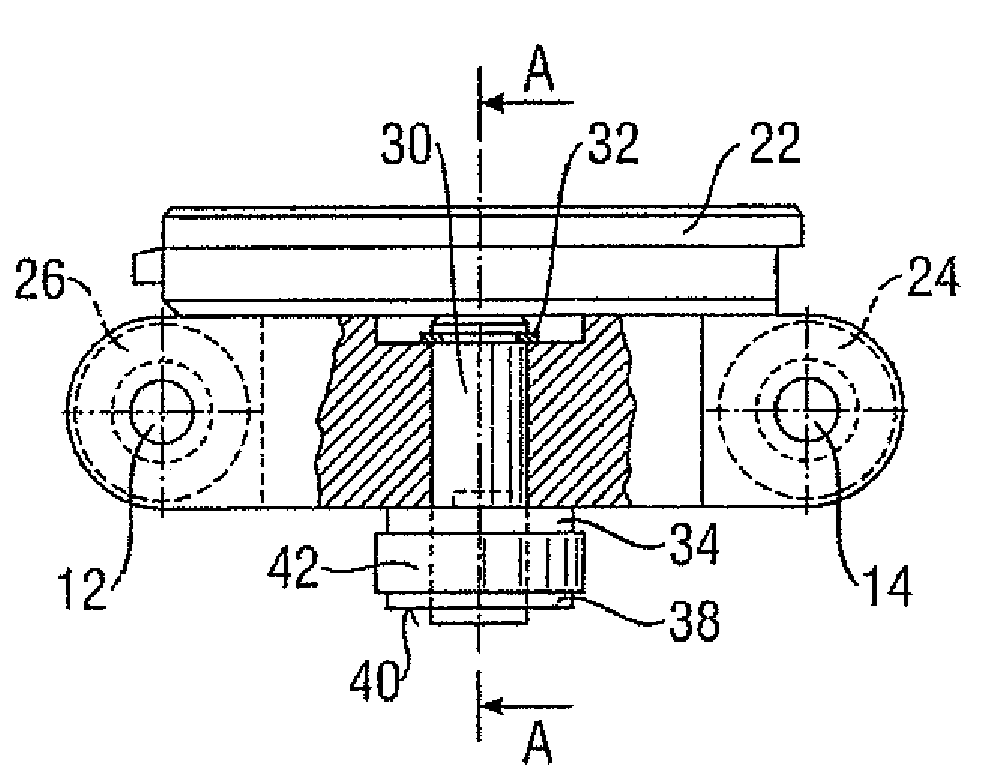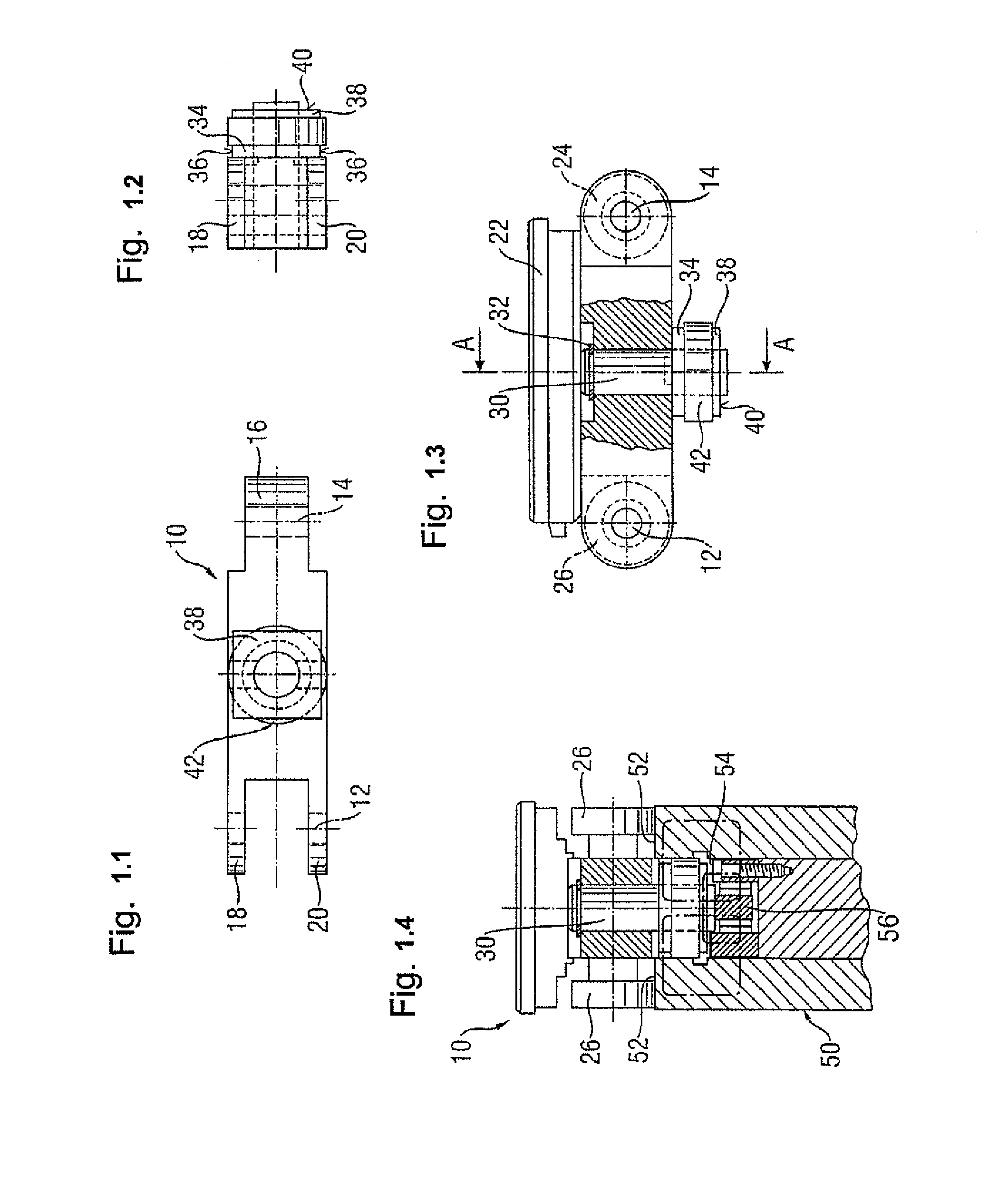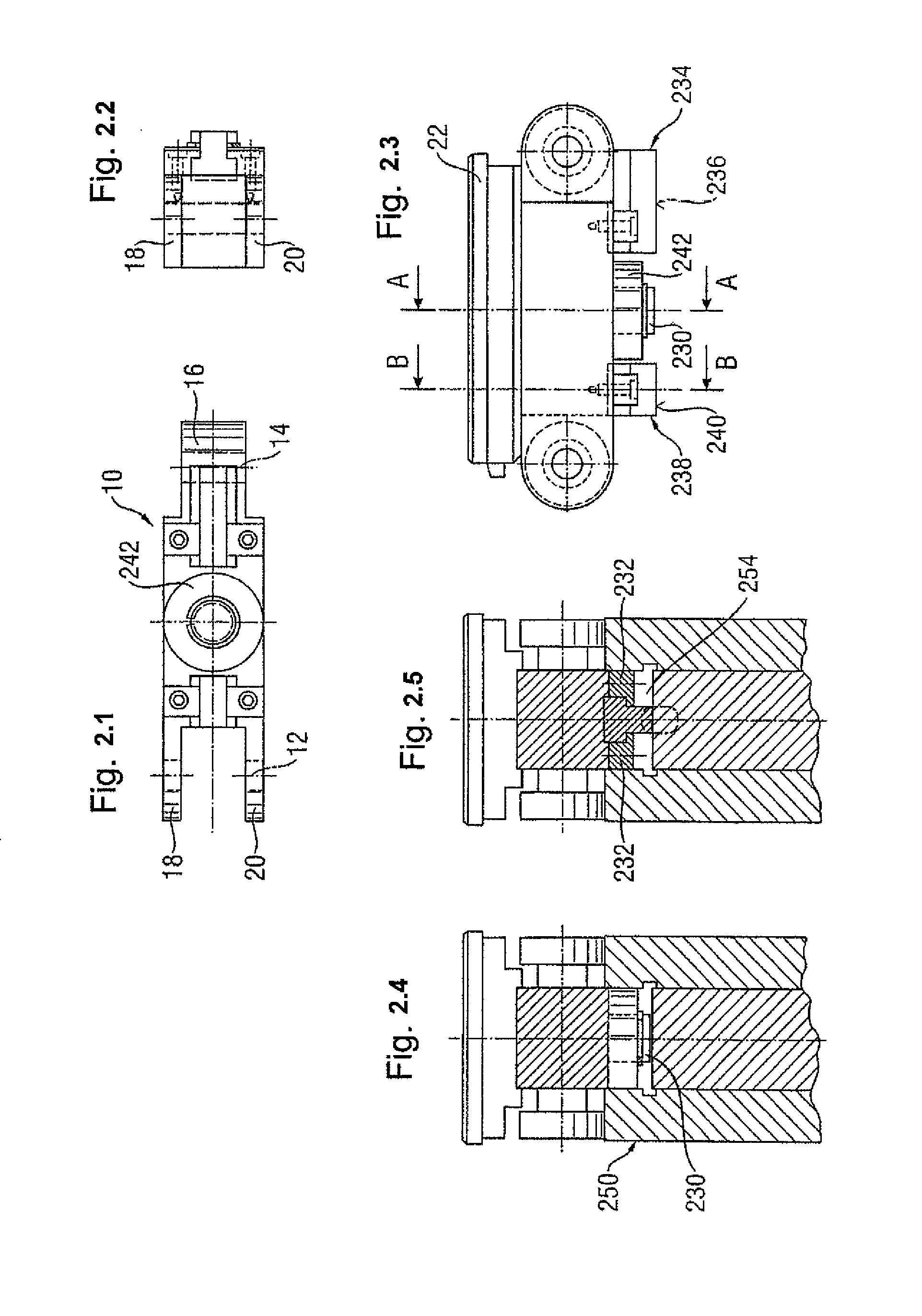Chain link for a circulating transport of a machine tool, and double end tenoner with guide chain formed from said chain links
a technology of chain link and machine tool, which is applied in the direction of transportation and packaging, conveyor parts, rollers, etc., can solve the problems of increased frictional corrosion, vibration or oscillations that are perceived detrimentally, and inadequate magnetic force direction in respect of vibration damping, so as to reduce the circulating workpiece support, and reduce the possibility of fretting corrosion
- Summary
- Abstract
- Description
- Claims
- Application Information
AI Technical Summary
Benefits of technology
Problems solved by technology
Method used
Image
Examples
first embodiment
[0046]FIG. 1 shows the FIG. 1.1 shows a bottom view, in which the chain link can be seen in general at 10. Roller axes 12 and 14 extend transverse to the longitudinal extent of chain link 10 and are only shown schematically here. In order to provide a connection to the neighboring chain links and thus to form a chain, chain link 10 has in the generally known manner at one end a bearing bush 16 and at the other end, two axle journals 18, 20. The axle journals 18, 20 grip around the bearing bush 16 of an adjacent chain link, and so the adjacent chain links are fastened together by way of an axle or shaft for the rollers 24, 26 (FIG. 1.3).
[0047]FIG. 1.2 shows a front view of chain link 10, in which it is also possible to identify axle journals 18, 20. The rollers 24, 26 and the workpiece support 22 are clear from FIG. 1.3 which shows a side view of the chain link illustrated in FIG. 1.1. The workpiece support 22 lies above the roller axes 12, 14, here in accordance with the preferred ...
second embodiment
[0057]FIG. 2 shows a second embodiment, in which the views of FIGS. 2.1, 2.2, 2.3 correspond to those of FIGS. 1.1, 1.2 and 1.3. FIG. 2.4 shows a section line running through the centre axis of the axle pin 230 for the transverse guide roller 242, along the course of the section line A-A from FIG. 2.3. FIG. 2.5 shows an additional cross-section, corresponding to the course of the section line B-B in FIG. 2.3.
[0058]FIG. 2 shows that lands 234, 238 are provided at a distance in front of and behind the transverse guide roller 242 in the direction of the circulation of the chain link. In the embodiment according to FIG. 2, the lands are formed from angle iron pieces 232 and permanent magnets. The permanent magnets also have a surface on which in conjunction with the chain guide 250, specifically with the bed of the guide groove 254, an air gap is formed. The air gap faces of the lands are identified as 236 and 240 accordingly. In the embodiment according to FIG. 2, because the permanent...
third embodiment
[0059]Similar lands are implemented in the third embodiment in accordance with FIG. 3, with the views as FIGS. 3.1, 3.2 and 3.3 corresponding to the numbered views in FIGS. 1 and 2. FIG. 3.4 shows a cross-section through the centre axis of the axle pin stub 330 for a transverse guide roller in accordance with the course of the section line A-A as shown in FIG. 3.3. FIGS. 3.5 and 3.6 show a comparison of the cross-section along the section line B-B from cut-outs 3.3 once with and once without the lands 334 and 338.
[0060]From the comparison of FIGS. 3.4, 3.5 and 3.6 described below, it is clear how the provision of the lands 234, 238 positively influence the formation of the magnetic circuit. The comparison is made on the basis of the embodiment in accordance with FIG. 3, but is also correct for the other embodiments.
[0061]As FIG. 3.4 shows, without the lands 234, 238 it is impossible to clearly forecast whether the magnetic circuit will close itself through the linear contact between...
PUM
 Login to View More
Login to View More Abstract
Description
Claims
Application Information
 Login to View More
Login to View More - R&D
- Intellectual Property
- Life Sciences
- Materials
- Tech Scout
- Unparalleled Data Quality
- Higher Quality Content
- 60% Fewer Hallucinations
Browse by: Latest US Patents, China's latest patents, Technical Efficacy Thesaurus, Application Domain, Technology Topic, Popular Technical Reports.
© 2025 PatSnap. All rights reserved.Legal|Privacy policy|Modern Slavery Act Transparency Statement|Sitemap|About US| Contact US: help@patsnap.com



